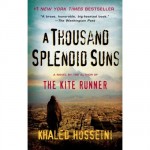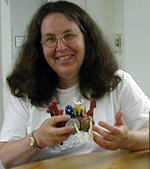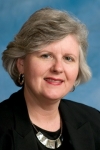 Sept. 4, 2009 – noon
Sept. 4, 2009 – noon
The MU Center for Social Justice hosts a film series every other Friday.
Memorial Union
Room: N214/215 (Benton Bingham Ballroom)
University of Missouri
Center on Religion & the Professions
Improving religious literacy among professionals.
by Debra Mason
 Sept. 4, 2009 – noon
Sept. 4, 2009 – noon
The MU Center for Social Justice hosts a film series every other Friday.
Memorial Union
Room: N214/215 (Benton Bingham Ballroom)
University of Missouri
by Debra Mason
 Summer Reading Speaker: “”Beyond a Thousand Splendid Suns: Exploring Afghanistan Today”
Summer Reading Speaker: “”Beyond a Thousand Splendid Suns: Exploring Afghanistan Today”
Jesse Auditorium
University of Missouri
Sept. 10, 2009 – 7:30 p.m.
by Debra Mason
Based the book by Dan Brown, Tom Hanks plays symbolist Robert Langdon in this Ron Howard directed movie:
Robert Langdon finds himself on an adventure following clues all around the Vatican. Joined by murdered physicist Leonardo Vetra’s daughter, Vittoria (Ayelet Zurer), Langon must solve the murder to unravel a plot by an ancient group, the Illuminati, who intend to blow up the Vatican during a papal conclave.
Admission is free.
Sponsored by the MSA/GPC Films Committee
Location information:
Aug. 28, 2009 – 7 p.m. and 9:30 p.m.
Aug. 29, 2009 – 7 p.m. and 9:30 p.m.
Wrench Auditorium
South Memorial Union (Room s107)
University of Missouri
by Debra Mason
 University of Missouri Kemper Scholar Dr. Lois Huneycutt presents a lecture on “The Religion of the Astronauts” about astronauts and their views on religion before and after being “up there.” The lecture is part of a series of “Hot Button Thursdays” lectures at Carpe Diem in Columbia. The series includes “lectures, talks and discussions on themes that may vary from curious to polemic; from funny to inconvenient.”
University of Missouri Kemper Scholar Dr. Lois Huneycutt presents a lecture on “The Religion of the Astronauts” about astronauts and their views on religion before and after being “up there.” The lecture is part of a series of “Hot Button Thursdays” lectures at Carpe Diem in Columbia. The series includes “lectures, talks and discussions on themes that may vary from curious to polemic; from funny to inconvenient.”
Huneycutt is an associate professor of history at University of Missouri.
July 9, 2009 – 7-8 p.m.
Carpe Diem
807 Locust St.
Columbia, Mo.
Free and open to the public. Space is limited. RSVP by sending an e-mail to info@carpediemcolumbia.com requesting number of seats. For more information, see www.CarpeDiemColumbia.com.
by Debra Mason
July 3, 2009 – Call for Participants: The Center on Religion & the Professions is forming new project teams for the upcoming academic year, to join existing teams. If you’re interested in training or research related to expanding professionals’ understanding of faith and spirituality in the lives of those they serve, please contact Center Director Debra L. Mason at MasonDL@Missouri.edu or (573) 882-9257. The 2009-2010 academic year’s work will focus on professional development tools and training.
by Debra Mason
by Debra Mason
Marc Adams shares his insights and reporting on his travels around the country helping LGBT youth in their struggle for acceptance.
Adams is the author of the critically acclaimed 1996 book, “The Preacher’s Son,” in which he shares his life experiences from age 3 to 23, chronicling his experiences growing up gay and his journey to self-acceptance.
July 2, 2009 – 7 p.m.
The Center Project, 907 East Ash St., Columbia
Contact Steve Clayton at 446-4094 or Linda Hayes at 864-1431 for additional information.
(Announcement provided by the City of Columbia Campaign for Human Rights).
by Debra Mason
June 17, 2009 – Debra L. Mason, director of the Center on Religion & the Professions, addressed more than 80 Kiwanis members during two recent speaking engagements. Mason spoke to a Columbia Kiwanis club on April 28 and to the Fulton Kiwanis Club on June 11, both on the topic of t he Center, religious literacy and the professions.
he Center, religious literacy and the professions.
In addition to directing the Center, Mason is a professor of journalism studies at the University of Missouri School of Journalism and executive director of the Religion Newswriters Association. She is a nationally recognized, award-winning and widely published specialist in religion journalism, with more than 25 years of professional teaching, research and reporting experience.
The Center on Religion & the Professions (CORP) was founded in 2003 with a mission of improving religious literacy among professionals, to help them serve a diverse public. It performs research and creates curriculum, resources and public programming to accomplish that goal. For more information about the Center, call (573) 882-9257.
by Debra Mason
June 17, 2009 – “Religious Literacy for the Public and Professions,” a new online course offered through MU Direct: Continuing and Distance Education, is under way. The course (REL ST 3100) teaches students to engage and encounter religion in day-to-day life and in the professional workplace. Its primary goal is to examine religious diversity in private and professional contexts from a practical standpoint by examining a variety of case studies. The course is open to University of Missouri students who are absent from campus for the summer or unable to attend day classes and to nontraditional students.
The course is offered through the University of Missouri’s Department of Religious Studies. The course was created by the department and the Center on Religion & the Professions at University of Missouri. The instructor is Justin Arft. The eight-week class runs June 8-July 31.
Textbooks for the course include “Religion and the Workplace” by Douglas A. Hicks and “How to Be a Perfect Stranger: The Essential Religious Etiquette Handbook” by Stuart M. Matlins and Arthur J. Magida.
After the course is completed and assessed, a team from the Center on Religion & the Professions (CORP) will author a chapter for a monograph about the project that will be distributed nationally through the Institute on Religion in Curriculum and Culture of Higher Education.
The Center on Religion & the Professions was founded in 2003 with a mission of improving religious literacy among professionals, to help them serve a diverse public. For more information about the Center, contact Director Debra L. Mason at (573) 882-9257 or MasonDL@missouri.edu.
by Debra Mason
A case study of a dispute over Muslim cab drivers refusing to transport alcohol because of religious beliefs
In October 2006, a woman returning to Minneapolis from a trip to France was refused service by five taxi drivers at the Minneapolis-St. Paul International Airport.
The woman had two bottles of wine in her suitcase, and the taxi drivers were Muslims. Most observant Muslims avoid alcohol, based on verses in their holy book, the Quran, which calls intoxicants “abominations of Satan’s handiwork” (5:90:91) and orders them to abstain. The Muslim taxi drivers refused to have alcohol in their taxis.
At the time of the incident, an estimated three-quarters of the Minneapolis airport’s 900 taxis drivers were Somalis, many of whom are Muslim, the Minneapolis Star-Tribune reported. The newspaper reported that potential customers carrying alcohol were refused taxi service about three times a day, with Metropolitan Airports Commission spokesman Patrick Hogan saying, “It’s become a significant customer-service issue.” Some Muslim cab drivers also asked dispatchers not to call them to pick up passengers wanting rides to liquor stores and bars, a USA Today article reported. By 2007, an estimated 5,000 people had been denied service in the previous five years because they carried alcohol, according to airport taxi officials.
Moral obligation or discrimination?
The same month, a transgendered woman in Minneapolis interviewed by the Fox 9 television news said that on three occasions Muslim taxi drivers who came to pick her up refused to take her, and that she often waited for cabs that never came. “This is more than just religion, it’s flat-out discrimination,” she said. As many as half of the drivers of Minneapolis’ 2,000 cabs are recent immigrants – many Muslim, the news channel reported. The Twin Cities is home to the nation’s largest Somali immigrant community, many members of which fled their East African nation’s civil war.
Some Muslim cab drivers reportedly also refused to transport passengers accompanied by dogs, including assistance dogs for people with disabilities. Islam considers the saliva of dogs to be unclean, said Hassan Mohamud, director of the Islamic Law Institute at the Muslim American Society of Minnesota. Some Somali cashiers refused to handle pork products during store checkout. The Quran prohibits eating pork. Similar conflicts arose in Australia and Canada about the same time.
The issue highlights a conflict between rights to religious belief and practice and rights to service without discrimination. The boycotting drivers believed the airport should accommodate tenets of their faith. Others – from cab customers to Minnesota residents and national bloggers – felt the drivers discriminated against those who did not share their faith and aimed to impose Islamic law. Federal law requires employers to make reasonable accommodations for religious beliefs, as long as they don’t place an “undue burden” on the business.
Workplace conflict
By the time of the October 2006 reports, the Metropolitan Airports Commission, which regulates the airport’s taxi service, had been discussing possible accommodations with drivers over the issue for about two years (with some reports saying the conflict had been brewing at least since 2000). The commission agreed to have drivers use lights on top of their cabs to identify them as drivers who would not transport alcohol. Airport personnel could then direct customers to a different driver. But the proposal incited a public backlash, with more than 400 responses from the public, most against the proposal.
In October 2006, the commission rejected the proposal, meaning that cabbies who refused fares would have to move to the back of the taxi line, a delay of three to five hours.
Mixed response
Not all Muslims shared the views of the cabbies who refused fares. Temple University Islamic scholar Mahmoud Ayoub pointed out in a USA Today article that the objection in the Quran is mainly to consuming intoxicants, often interpreted as alcohol. And many Muslims own businesses that sell beer or serve pork, he said.
Omar Jamal, executive director of the Somali Justice Advocacy Center said: “We tell taxi drivers, if you don’t want to do this, change your job. You are living in a country where alcohol is not viewed the way it is in your country.” Some Somali immigrants and advocates said they feared the conflict would sever relationships with mainstream groups and employers, and that Muslim employees were manipulated by religious extremists.
However, the Minnesota Chapter of the Muslim American Society, which backed the protesting employees, believed an accommodation of the drivers was appropriate. “More than half the taxi drivers are Muslim and ignoring the sensibilities of that community at the airport I think is not fair,” Hassan Mahamud, vice president of the MAS Minnesota chapter, said in a USA Today article. In 2006, MAS issued a fatwa or religious edict, saying that “Islamic jurisprudence” prohibits cab drivers from carrying customers with alcohol “because it involves cooperating in sin according to Islam.” MAS, which was founded by U.S. members of the Muslim Brotherhood, promotes the spread of Islamic influence through political parties and militant groups in the Middle East, according to a USA Today article.
Some Muslim cab drivers said the refusals were not a choice but part of their religion, and that drivers who knowingly transported alcohol would have to answer to God on Judgment Day. Some also framed it as a civil liberties issue. Abdisalam Hashim, a Somali Muslim and taxi manager, said in a USA Today article, “When I’m American, I have freedom to practice my religion and freedom to work anyplace I want to work. This is the way we address Islam. … We have the right to say this is how we do it.”
Response from non-Muslims during the conflict ranged from support for civil liberties and religious expression, to anger at the boycotting cabbies. “GET OVER IT, you are in America act like an American!’ a comment on one online bulletin board said. “Americans are not going to put up with this. If they won’t do the job they were hired to do … fire them,” a blogger posted. Eva Buzek, the woman with the wine whose story was told in 2006 and a Polish immigrant, said in 2007, “In my book, when you choose to come to a different country, you make some choices. I never expected everything to be the same way as in my homeland, and I adjusted. I never dreamed of imposing my beliefs on somebody else.”
Resolution?
In 2007, amid public complaints about lack of service, the Minneapolis airport commission approved a proposal to suspend airport licenses for cab drivers who refused service for reasons other than safety. This included a 30-day suspension for a first offense and two-year revocation for a second offense. “Our expectation is that if you’re going to be driving a taxi at the airport, you need to provide service to anybody who wants it,” Hogan, the commission spokesman, said in a Star-Tribune article. Some Muslim drivers felt the new rules persecuted based on religion.
Later in 2007, Muslim employees of three Twin Cities taxi companies offered to provide free rides to blind people and their guide dogs who attended a convention of the National Federation of the Blind of Minnesota. The Minnesota chapter of the Council on American-Islamic relations, America’s largest Islamic civil liberties group, backed the effort. CAIR members and some Muslim cab drivers said that reports of Muslim cabbies refusing rides to blind people with dogs were untrue and that drivers had been misrepresented in the media. The effort did not address other types of boycotts.
• Based on the overview above, what happened? Why?
• What could have been done differently? By whom?
• Would it have made a difference? What difference?
• Why was religion problematic in this situation?
• What is the responsibility of taxi drivers to the public? What about other professions?
• What, if anything, can be learned? How do we prevent such occurrences in the future? Should we?
• Are Constitutional rights, religious advocacy groups, and professional organizations sufficient to handle such problems? If not, who should address them?
• What would you have done differently, as a cab driver, a Muslim, a passenger, a non-Muslim, an airport official, a religious leader?
• Do you think there was a “right” and “wrong” position here? If so, whom do you believe was “right?”
• Have you faced similar conflicts in your own profession? If so, what were they? Were they resolved? How were they resolved?
• Do you think education about religious literacy would have helped/harmed in this situation? How so?
Compiled by Amy White